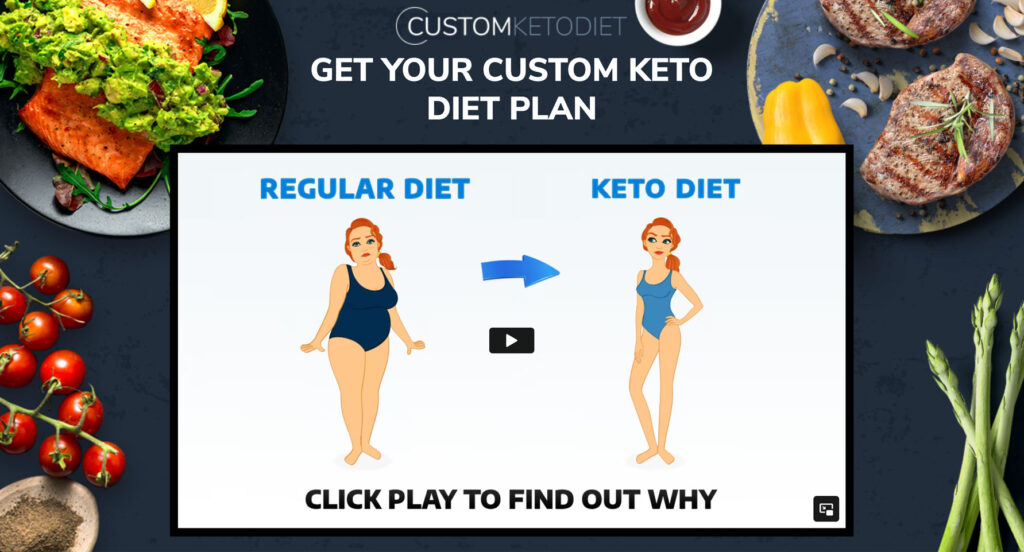
Ketogenic Diet: Are you looking to shed some extra pounds and improve your health? The keto diet might be worth considering. This low-carb, high-fat diet has gained popularity in recent years due to its potential benefits for weight loss and various health conditions.
In this comprehensive guide, we’ll explore how the keto diet works, its potential benefits, and some tips for getting started.
Take your Keto Quiz and Get a Personalized Diet Plan

What is the Keto Diet?
The keto diet is a low-carbohydrate, high-fat diet that encourages the body to enter a metabolic state called ketosis. In this state, the body burns fat for fuel instead of glucose, which is typically obtained from carbohydrates.
To achieve ketosis, you must significantly reduce your carbohydrate intake and increase your fat intake. The standard keto diet typically involves getting 70-80% of your daily calories from fat, 10-20% from protein, and 5-10% from carbohydrates.
Benefits of the Ketogenic Diet
Weight Loss:
The keto diet can be an effective way to lose weight, as it encourages the body to burn fat for fuel instead of glucose. Studies have shown that people on the keto diet tend to lose more weight than those on low-fat diets.
Improved Brain Function:
The brain requires a steady supply of glucose to function properly. However, when the body is in ketosis, it produces ketones that can be used as an alternative source of fuel for the brain. This may improve cognitive function and potentially reduce the risk of neurodegenerative diseases such as Alzheimer’s.
Reduced Risk of Certain Diseases:
The keto diet may also have potential benefits for reducing the risk of certain diseases, such as type 2 diabetes, cardiovascular disease, and some types of cancer. This is because it can help improve blood sugar control and reduce inflammation in the body.
Getting Started with the Ketogenic Diet
If you’re interested in trying the keto diet, here are some tips for getting started:
- Calculate your macronutrient needs: To achieve ketosis, you’ll need to carefully track your macronutrient intake. Use a keto calculator to determine how much fat, protein, and carbohydrates you should be eating each day.
- Plan your meals: Plan your meals in advance to ensure that you’re getting enough fat and protein while staying within your carbohydrate limit.
- Choose healthy fats: While the keto diet is high in fat, it’s important to choose healthy fats such as olive oil, avocados, and nuts.
- Stay hydrated: Drinking plenty of water is important on the keto diet, as it can help reduce the risk of dehydration and kidney stones.
- Be patient: It can take several days or even weeks to enter ketosis, so be patient and stick with it.
What to Eat on the Keto Diet
To achieve ketosis, you must significantly reduce your carbohydrate intake and increase your fat intake. The standard keto diet typically involves getting 70-80% of your daily calories from fat, 10-20% from protein, and 5-10% from carbohydrates.
Foods that are commonly consumed on the keto diet include:
- Meat and poultry
- Fish and seafood
- Eggs
- Non-starchy vegetables
- Healthy fats, such as olive oil, coconut oil, and avocados
How to Track Your Macros
Tracking your macronutrient intake is essential for achieving and maintaining ketosis. You can use a keto calculator to determine how many grams of fat, protein, and carbohydrates you should be consuming each day. Then, use a food diary or app to track your daily intake and ensure that you’re staying within your targets.
Potential Side Effects
While the keto diet can be effective for weight loss and other health benefits, it can also cause some potential side effects. These may include:
- Keto flu: This is a collection of symptoms that can occur in the first few days or weeks of starting the keto diet. Symptoms may include fatigue, headaches, and nausea.
- Digestive issues: The high-fat content of the keto diet can sometimes cause digestive issues such as constipation or diarrhea.
- Bad breath: The production of ketones can cause bad breath, also known as “keto breath.”
The keto diet is a low-carb, high-fat diet that can be an effective way to lose weight, improve brain function, and potentially reduce the risk of certain diseases. If you’re interested in trying the keto diet, be sure to consult with your healthcare provider and follow these tips for getting started. With time and patience, you may find that the keto diet is the key to unlocking a healthier you.



[…] Read More: Keto 101: The Ultimate Beginner’s Guide to the Ketogenic Diet […]
[…] Keto 101: The Ultimate Beginner’s Guide to the Ketogenic Diethttp://sundaymania.com/keto-diet-benefits-and-drawbacks/ […]